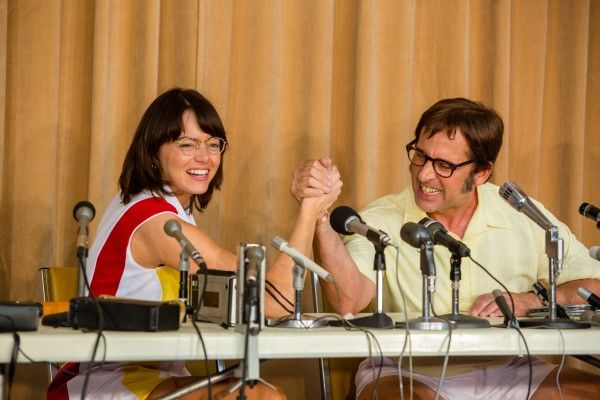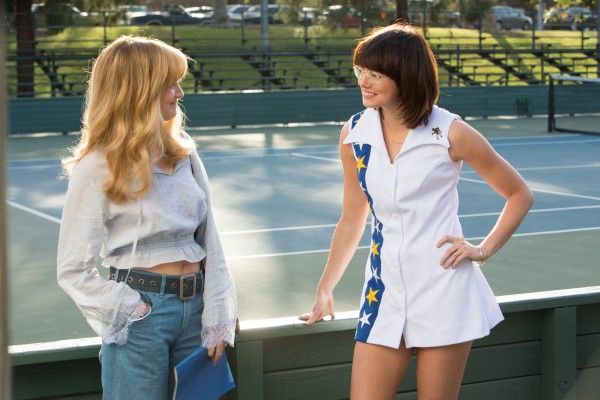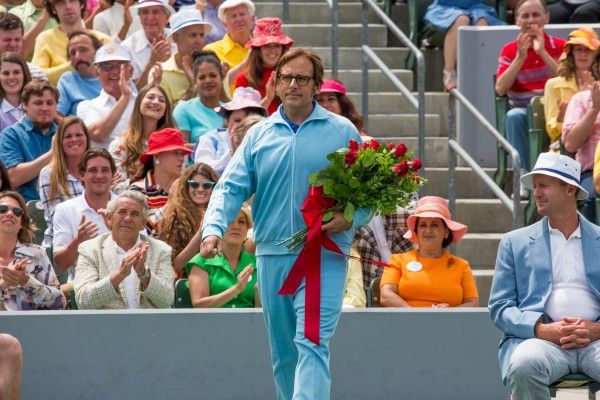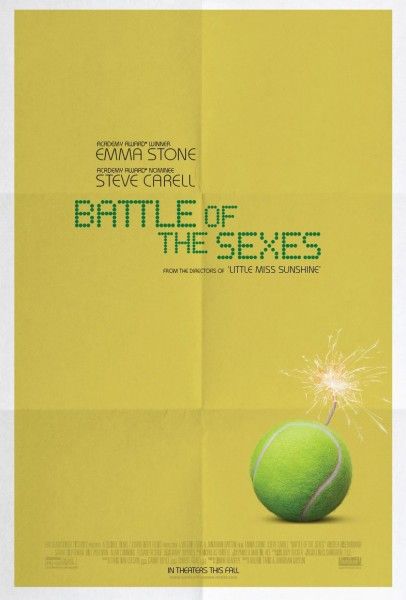[This is a re-post of my Battle of the Sexes review from the 2017 Toronto International Film Festival. The movie opens in limited release on September 22nd.]
Given the title and the subject matter—an adaptation of the 1973 tennis match between former great Bobby Riggs and champion Billie Jean King—one would assume that Jonathan Dayton and Valerie Faris’ Battle of the Sexes would deal with sexism head-on. Instead, while the opening of the movie feints in that direction, it transforms into a story about King’s homosexuality, which would be fine if the movie knew what to do with it beyond using it for dramatic effect. It’s like Dayton and Faris couldn’t figure out how to do an entire film about modern sexism and used King’s personal life as filler rather than something that connected to a larger point. Although it’s largely affable despite its shortcomings, the movie feels like a weak gesture rather than a grand slam.
In 1973, Billie Jean King (Emma Stone) was on top of the tennis world having just won the Women’s U.S. Open. When the association’s head, Jack Kramer (Bill Pullman), tells King that she and her fellow female tennis players will only be paid 1/8th of what the men make despite bringing in an audience that’s just as big, she and her manager Gladys (Sarah Silverman) decide to form the Women’s Tennis Association even though it means less money in the short-term. Meanwhile, hustler and former Wimbledon champ Bobby Riggs (Steve Carell) is always looking for the next hustle even though his gambling has distanced him from his wife (Elisabeth Shue) and son (Lewis Pullman). Looking at King’s mission, Riggs decides to turn it into a hustle, playing the part of the male chauvinistic pig to King’s feminist icon and saying he, as a member of the “dominant” sex, can beat any woman on the tennis court. Initially reluctant to play Riggs’ game, King eventually realizes that she’ll have to beat Riggs to disprove his argument.
Although the “Battle of the Sexes” may be the film’s major conflict, it spends most of its first half just following the lives of King and Riggs, especially King’s relationship with hairdresser Marilyn Barnett (Andrea Riseborough). It’s a story that would be worth exploring on its own as King, a closeted homosexual with a husband (Austin Stowell), knows that if she was outed, she would lose everything—her parents, her husband, her endorsements, and her career. There’s a sad undercurrent to King’s story that in 1973, it’s a struggle just to fight for women’s rights. To fight as a gay woman too is just too much.
When the movie follows Riggs, it’s not really sure what to do with him. His story largely has no connection to King’s thematically or even narratively beyond their eventual tennis match. But the movie feels obligated to flesh out his story and his home life while rarely finding anything as heavy as King’s personal struggle. If anything, Riggs’ gambling is seen as a character quirk rather than a flaw, and the movie even excuses his chauvinism as the act of a talented showman rather than loathsome misogyny.
Trying to split hairs on chauvinism is where the movie lost me for a bit. There’s a scene where King confronts Kramer and tells him that while Riggs’ behavior is bad, it’s ultimately an act and therefore excusable, but Kramer is genuinely harmful because he supports systemic sexism that reinforces lower pay and fewer opportunities for women. Because the movie wants us to have some sympathy for Riggs, it doesn’t acknowledge that sexism is harmful no matter the motives. Riggs wasn’t a satirist trying to play up a misogynistic character to point out how society devalues women. He was a hustler who was happily willing to beat female tennis players and reinforce the notion that men are superior. Just because Riggs had less power than Kramer and played up his chauvinism for a payday, it doesn’t make his behavior any less reprehensible.
Additionally, the movie doesn’t need to work overtime to make us sympathetic about Riggs because they cast Steve Carell. Carell spent seven seasons and earned six Emmy nominations playing the buffoonish Michael Scott on The Office, and if he can make us care for seven years about a person who behaves the way Michael does, he can make us care about Riggs. He’s an inherently likable actor; the stretches are the characters who are actively despicable like John du Pont in Foxcatcher or Trent in The Way Way Back.
Even though it falls dreadfully short on a thematic level, Battle of the Sexes does manage to coast along thanks to the charm of its cast and using the framework of a sports story. What makes it such a frustrating picture is that it glances at sexism and homophobia, and then wants credit for being socially conscious rather than trying to seriously engage in those topics.
Rating: C-





